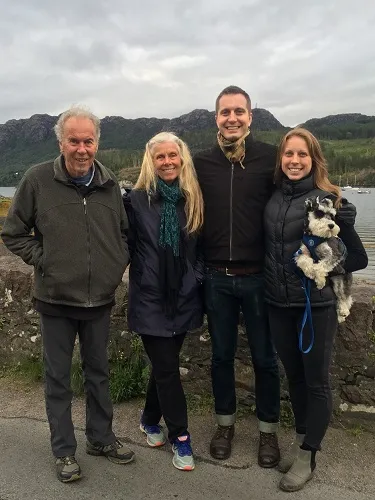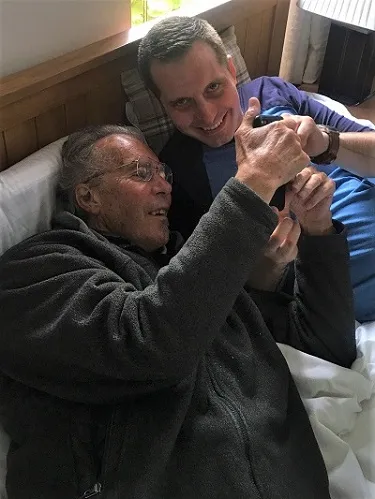A Marco Polo Parkinson’s Miracle

After a new treatment all but eliminated the symptoms of Andy’s Parkinson’s Disease, he experienced an unexpected and heartbreaking side effect. Andy’s wife, Michelle, shares the story of Andy’s journey – and how Marco Polo helped him reconnect with the people he loved.
My husband, Andy, has lived with Parkinson’s disease since 2005. It has not been an easy journey. Parkinson’s never is.
Andy lived through almost seven years of extreme disability during which he was unable to feed himself, get out of a chair, walk, or roll over in bed without help. His voice became his saving grace, allowing family and friends to access the true Andy who was hidden inside that suffering body.
In early 2014, after working with almost every alternative therapy under the sun, Andy chose to have deep brain stimulation surgery (DBS), a process of implanting electrodes in his brain to help regulate his movement.
The results were dramatic. After the procedure, Andy completely stopped shaking. The components of independent life that empower a person – walking, driving, cooking, working out at the gym – all became possible again.

The kicker was that the surgery that gave Andy his life back also took away his voice.
In the first few months after the electrodes were programmed, his voice got raspier and quieter until it finally disappeared into the softest whisper. For Andy and for all of us who had used his voice as a lifeline for so long, it was a devastating blow. After a day of working or doing errands, I’d come home to silence. No one could hear him on Skype or the telephone. Our kids, who all lived far away, weren’t able to maintain a connection with their dad between visits. Common voice therapies didn’t work because Andy’s whisper wasn’t caused by Parkinson’s itself but by his remedy, the stimulator.
I also noticed another symptom of Parkinson’s creeping in, cognitive slowness. Many direct questions had one answer: I don’t know. After awhile I realized that he did know but couldn’t respond with a speed typical of non-Parkinson’s people. I adapted one-on-one, but in group situations Andy usually got steamrolled by the volume and pace of conversation. His sadness and feelings of isolation grew.
Then last spring on a visit to Chicago, my sister Jenni showed me an app called Marco Polo and asked if I’d be interested in trying it. She said that unlike other video communication apps, you don’t need to be live. I played along, downloaded the app, and we created a group for the two of us plus my mom and our other sister, Kathy.
Weeks later, back at home, I recorded a Polo for the group and spontaneously turned my phone toward Andy, who was sitting next to me. He whispered Hi to the group. Later I played back the Polo so he could see what the app was all about, and we were shocked: We could hear his whispers loud and clear on the recording! We heard his voice! Nobody could hear him that well in person, on the phone, or over Skype. But Marco Polo worked.

After that, Andy was off and running. The enhanced volume made him audible, and the recording and playback format helped him relearn the art of conversation at a cognitively comfortable pace. He got into the habit of listening to a Polo several times and making notes about his reply before tapping ‘Start’ to respond.
Andy and our son, Brendan, have reconnected in a big way, even joining a fantasy football league together. Our daughter, Alana, has brought him into her life in London; he’s been known to give her judicious fatherly advice. He and his brother, Roger, find themselves laughing an awful lot over Marco Polo. I’m not quite sure what they’re laughing about, but it’s the laughing that matters.
Marco Polo has given Andy a way to communicate with the people he loves and who love him back. His isolation is a thing of the past.
Michelle Terrill Heath is the author of The Dirty Little Secret: A Parkinson’s Love Story. Learn more of Michelle and Andy’s story at michelleterrillheath.com.